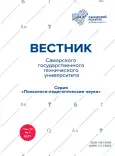Психосемантический подход как основа технологии алгоритмизации обработки учебной информации
- Авторы: Цупикова Е.В.1, Цыгулева М.В.1
-
Учреждения:
- Сибирский государственный автомобильно-дорожный университет
- Выпуск: Том 18, № 3 (2021)
- Страницы: 63-84
- Раздел: Педагогика высшей школы
- URL: https://journal-vniispk.ru/1991-8569/article/view/71197
- DOI: https://doi.org/10.17673/vsgtu-pps.2021.3.5
- ID: 71197
Цитировать
Полный текст
Аннотация
Основным качеством современного специалиста какой бы то ни было области все чаще называют его способность самостоятельно повышать свой профессиональный уровень, стремление к саморазвитию и самообразованию. Данная деятельность требует определенной интеллектуальной и психологической мобильности, желания получать и перерабатывать большие объемы новой сложной информации и умения на основе новых полученных знаний корректировать, дополнять, перестраивать систему своего опыта и деятельности. Формирование нового стиля мышления становится важнейшей задачей обучения на этапе перехода к информационному обществу, которое выдвигает на первый план надпрофессиональные навыки самообразования и самоорганизации. Статья посвящена обоснованию введения в учебный процесс элементов алгоритмизации работы над учебным текстом на основе психосемантического подхода. Описаны семантические принципы (соотнесение логических и лингвистических категорий, рассмотрение текста со стороны внешней и внутренней речи, понимание текста как когнитивной и коммуникативной сущности;разграничение значения и смысла как семантики внешней речи и семантики мышления; установление смысловых связей между элементами информации и др.), психологопедагогические принципы (авторефлексивное сопровождение учебной деятельности; нахождение мотивации посредством определения полезности и применимости информации; самоорганизация в процессе создания собственных алгоритмов деятельности и др.) и психолингвистические принципы (построение аналогов универсальных предметных кодов — опорных логических схем; смысловое оценивание количества и качеств информации и др.) работы с информацией научных и учебно-научных профессионально ориентированных текстов, соотнесены с содержанием обучения и закономерностями протекания речемыслительной деятельности обучающихся. Выявлены психолингвистическая, семантическая и организационная компетенции, определен их состав в виде знаний, умений и навыков студентов, формируемых в ходе обучения. Предложена технология алгоритмизации работы студентов с текстовой информацией профессионально ориентированного плана на основе психосемантического подхода. Цель алгоритмизации процесса обучения — ускорение темпов работы студентов и повышение качества освоения информации.
Ключевые слова
Полный текст
Открыть статью на сайте журналаОб авторах
Елена Викторовна Цупикова
Сибирский государственный автомобильно-дорожный университет
Email: chisel43@yandex.ru
ORCID iD: 0000-0002-7849-4843
доктор педагогических наук, профессор, кафедра «Иностранные языки»
Россия, ОмскМаргарита Викторовна Цыгулева
Сибирский государственный автомобильно-дорожный университет
Автор, ответственный за переписку.
Email: m.v.tsyguleva@gmail.com
ORCID iD: 0000-0002-6957-4438
кандидат педагогических наук, доцент, кафедра «Иностранные языки»
Россия, ОмскСписок литературы
- Жинкин Н.И. О кодовых переходах во внутренней речи // Вопросы языкознания. – 1964. – № 6. – С. 26–38.
- Жинкин Н.И. Речь как проводник информации. – М.: Наука,1982. – 159 с.
- Якобсон Р.О. Лингвистика в ее отношении к другим наукам // Якобсон Р.О. Избранные работы. – М.: Прогресс, 1985. – 460 с.
- Цупикова Е.В., Рахуба Л.Ф. Интеграция теоретических положений лингвистики и наук об информации в разработке содержания обучения, направленного на развитие речемыслительной деятельности студентов посредством формирования у них универсальных когнитивных умений // Вестник Череповецкого государственного университета. – 2020. – № 5 (98). – С. 214–226.
- Дейкина А.Д. Формирование культуроведческой компетенции учащихся при обучении русскому языку. – М.: Прометей МПГУ, 2005. – 135 с.
- Yakmut Daniel, Odu Alice. A Simpleto Complex Approachto Integrating Technology in Teaching. The 6th Annual International Conference on ICT for Africa “Har-nessing ICT in Education for Global Competitiveness”.2014. Pp. 232–239.
- Sivis-Cetinkaya Rahsan. A combined approach to teaching counselling ethics: a preliminary study. British Journal of Guidance & Counselling. 2017. No. 47. Pp. 1–9.
- Bogaerts L., Frost R., Christiansen M.H. Integrating statistical learning into cognitive science. Journal of Memory and Language. Elsevier BV, 2020. Vol. 115.Pp. 104167.
- Петренко В.Ф. Основы психосемантики. СПб., 2005. – 480 с. – С. 4–12.
- Kleinman D., Runnqvist E., Ferreira V.S. Single-word predictions of upcoming language during comprehension: Evidence from the cumulative semantic interference task. Cognitive Psychology. 2015. Vol. 79. Pp. 68–101.
- Bentin Sh., Frost R. Linguistic theory and psychological reality: a reply to Boudelaa & Marslen-Wilson. Cognition. 2001.Vol. 81. No. 1. Pp. 113–118.
- Выготский Л.С. Сознание как проблема психологии поведения // Психология развития человека. – М.: Смысл; Эксмо, 2003. – 1136 с. – С. 18–41.
- Выготский Л.С. Мышление и речь // Выготский Л.С.Собрание сочинений: В 6 т. Т. 2. Проблемы общей психологии / Под ред. В.В. Давыдова. – М.: Педагогика, 1982. – 504 с.
- Лурия А.Р. Язык и сознание. – М.: Изд-во МГУ, 1979. – 319 с.
- Леонтьев А.Н. Деятельность и личность // Психология личности. – Т. 2. – Самара: Бахрах-М, 2008. – 543 с. – С. 165–187.
- Жинкин Н.И. Язык – речь – творчество: избранные труды. – М.: Лабиринт, 1998. – 368 с.
- Гальперин П.Я. К вопросу о внутренней речи // Доклады АПН РСФСР. – М., 1967. – Вып. 4. – С. 34–41.
- Бахтин М.М. Человек в мире слова. – М.: Изд-во Рос. открытого ун-та, 1995. – 139 с.
- Цупикова Е.В., Цыгулева М.В. Экспериментальная проверка модели формирования умений авторефлексии в организации НИРС на основе информационного и когнитивного подходов // Вестник Омского государственного педагогического университета. Гуманитарные исследования. – 2019. – № 3 (24). – С. 172–178.
- Миллер Дж. Магическое число семь плюс или минус два // Инженерная психология. – М.: Прогресс, 1964. – С. 192–225.
- Цупикова Е.В. Семантическая структура текста в технологии интенсификации развития речи и мышления студентов и оптимизации учебного процесса средствами лингвистики научных и учебно-методических статей. – М.: Перо, 2016. – С. 57–66.
- Цупикова Е.В., Данилина Ю.С. Информационные процессы и универсальные учебные действия как авторефлексивная основа учебной работы студентов // Известия Российского государственного педагогического университета им. А.И. Герцена. – 2020. – № 198. – С. 89–98.
- Бельдиян В.М. Основы дидактолингвистики. – Омск: Изд-во ОмГПУ, 2007. – 118 с.
- Рубинштейн С.Л. Основы общей психологии. – СПб.: Питер, 2003. – 713 с.
- Гальперин П.Я. Введение в психологию. – М.: Книжный дом «Университет», 2000. – 329 с.
- Горковенко В.А. Лингводидактические основы структурирования терминологической лексики (на примере терминов специальности «Наземно-транспортные технологические средства») // Актуальные вопросы современности глазами молодых исследователей. – Омск: СибАДИ, 2019. – С. 27–35.










